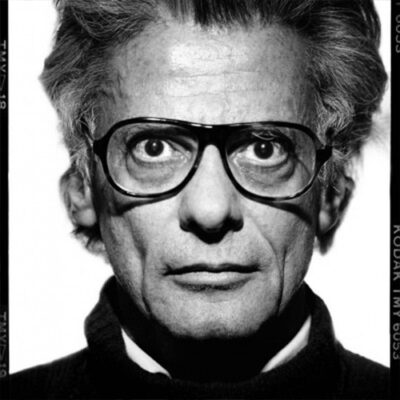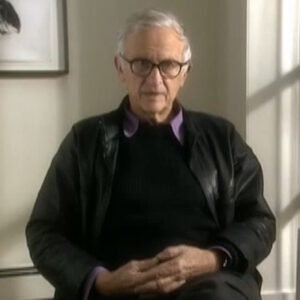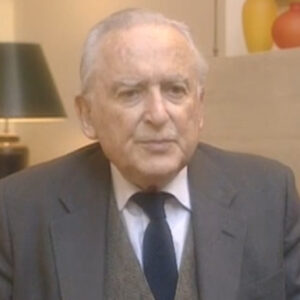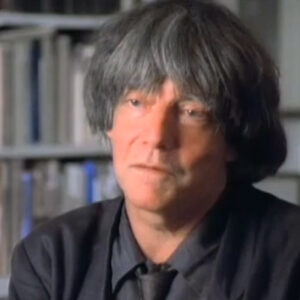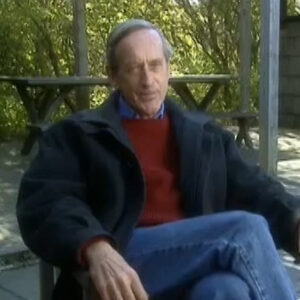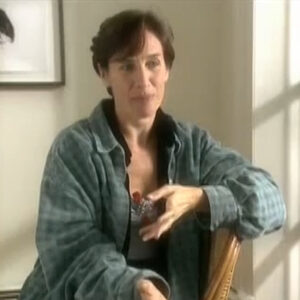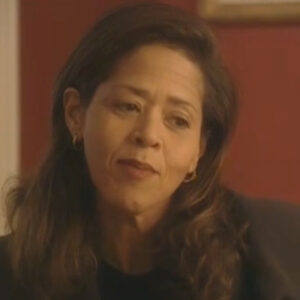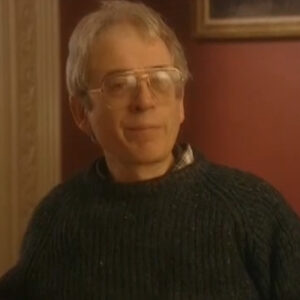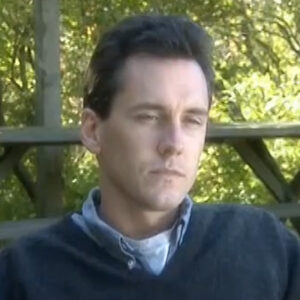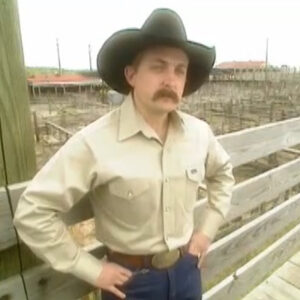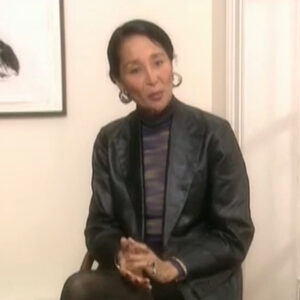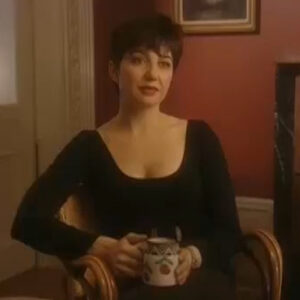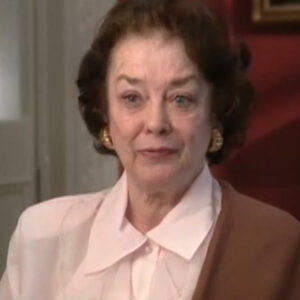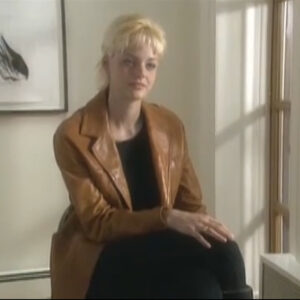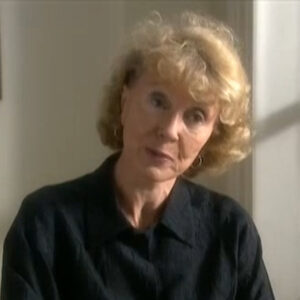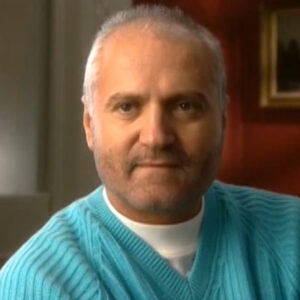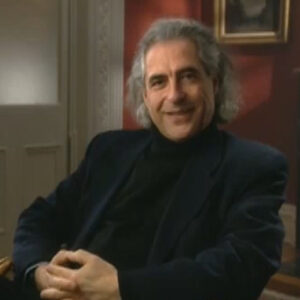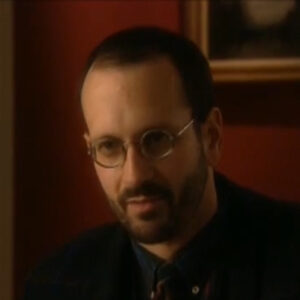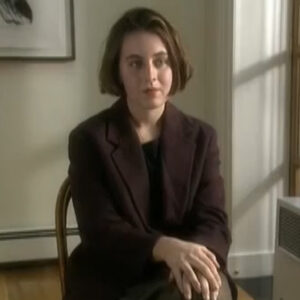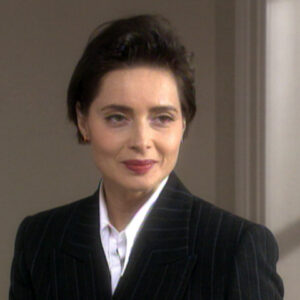Speaker I said, I can’t see his studio as assistant. Nineteen fifty six.
Speaker Then I became one as a matter of fact. He made me encourage you to become a photographer in 1957. So less about 10 months later, I became his associate. And we’ve been we’ve shared a studio until 19.
Speaker Fifty seven to 60 where. 70.
Speaker So that’s a long time. So we physically work together in the studio as a photographer. Then my family grew up with me. My kids grew up with Dick being around. It’s part of family.
Speaker So this first became aware of you word?
Speaker Oh, this is very fascinating one for me at least. I was 17. This is nineteen forty seven. Can you imagine? It took it. Forty seven. It’s totally devastated. We had had anything to eat and it’s gone on. Why? I said I’m going to become a photographer. People thought I was crazy.
Speaker Previous to that, I want to be a doctor. Well, anyway, I made up my mind to become a photographer. Then I had problem of how to educate myself. What kind of photography, etc..
Speaker What happened was I start looking at all the magazines because they had no museums. There’s no galleries place or the Brown bombed out from the World War Two to name stuck with me was one easy, richer than with the ones that are being panned each time I come across these there images. Something triggered in me.
Speaker It’s not like I knew then. Nothing like that.
Speaker Then I somehow all the magazines, the images, I was sort of exposing myself to the inner thigh as a photographer. You see, that’s the first thing you have to look at things.
Speaker And something I’d react with the images each time I it that was pen or. So I said the next stage that I have to put in New York. That’s why I come to New York in 1954.
Speaker And despite the choice, one of the was closer to you, which you chose. You saw each other.
Speaker I went one way and so I came to New York. That was a very difficult period for me because I couldn’t make up my mind which way to go, Abbadon or Penn. And the more so, I said, well, I must stay put.
Speaker And I do more homework, so speak, to make decisions. It’s like I was in focus, borrowed. Go left or right. It’s a major, major thing to do. I knew that kind of a judgment. I had this kind of I can ask them to able to stay put in that kind of a situation.
Speaker And I kept looking at the daily images coming out in the bazaar, coming out in vogue, and simply I felt more intrigued.
Speaker Now I have a better word than that.
Speaker I could understand how our Don’s thinking was to create those images pens. I wouldn’t say I understand it, but I felt something closer to me in my personal nature or the feeling of things or et cetera.
Speaker So it was my reaction to that. His image was much more.
Speaker Strange form to me. Something I never was exposed to. I had no way of understanding what the hell it is. So I obviously went for it.
Speaker How would you characterize the strangeness of the images as opposed to some of the images from yours?
Speaker I think this is to me, out of his image is a total energy.
Speaker Pen’s image is a mood which is closer than you see, I, I tend to go in that direction because I think.
Speaker My the way I photograph, the way I feel thing, it’s slightly sort of surreal quality to it. I see life that way. Growing up in a wars and strangeness of the Japanese in a China battle in Japan against stranger, never live in Japan. I was born in China, then come to New York. So I see the world in that slightly surreal kind of a feeling that reality to fantasy is a mixture of things.
Speaker And I see that in Japan, the work still I for example, to me I have eyes, pure energy. It just sort of for example, his portrait hit me when I look at it. There’s no background, pure white background. Their eyes, their mouth.
Speaker It’s not you can’t pick said all their fingers. His hands. Something about it. Just sort of dynamic. It’s just vibrate by itself. I have a photograph of the both photographers in a collection in the house. It’s a still after all these years. Some I have over fifteen years and I still feel the same way.
Speaker Describe that moment, what exactly you you should. Describe that moment for me when they said I was scared, you wouldn’t believe.
Speaker It’s kind of. Suddenly I feel like I was thrown into like a ring of the bull fighting ring or something like that. You have to perform. And he hit me and he said, look, you can be a photographer.
Speaker He said, right now we’re not a typical big Iverna. Why not? I said, Yeah, why not? Though I was off. Was I like that sheer panic. Fright? I mean, my pop.
Speaker And that summer when he left New York, he left his studio since I was assistant. And he left it in my trust, said, don’t do anything, just take a photograph. And I photographed he made it very clear, said, look, do this still life. How would you do that? Very commercial for.
Speaker But I couldn’t think like two, three days.
Speaker I couldn’t think anything. Just a blank. It was total kind of fear settling me and. But I started that summer and he came back in September. And look at the photographs we took together. What I did some. He was very critical. Some almost the outrage there. What are you thinking? I said, I don’t know. I said, well, you know, it’s your photograph. Typical again, you know, sort of to the point. No. What I call it the nursing you. He’s coming from where he is. Give me that. Me who I was.
Speaker My fear, for example, degree of fear, but I think was a very good initiation for me. I learned very quickly I had to.
Speaker Was it relentless? Every day he was there. I was there every day. So, you know.
Speaker Two or three less.
Speaker What did you do that for you later on photography?
Speaker I think something is interesting. What I learned from what I didn’t learn from his. It’s very interesting.
Speaker I didn’t learn far away from him at all. I knew a lot about what especially technical part of it already. I knew enough. And that model for a few months, I said, you know, there’s nothing I can learn from him. Take a photographic technically. But as an artist, as a Lyssa American, I was an American. I came from Japan. I was Japanese. That’s my background. I said I must learn everything about how. Specialty is his way of thinking and his intensity. I had that already similar kind of bar intensive canasta. Whatever you call it, commitment. But what I learned, his intelligence, I think, had something to do.
Speaker Or I can tell you. When I came to his studio after two years in New York was incredible expanse.
Speaker Suddenly, fresh air, the horizon opened up. He didn’t say anything. He didn’t do anything. But it’s kind of what I was exposed to.
Speaker That’s when I can describe it. What was it the occasion, was it. Oh, I’m sorry, intelligence.
Speaker It was in that air freshness, dynamic ness of it and delicacy of it, knowing where one is going. Oh, it. Because I was very confused from my background. For example, is because my parents wasn’t particularly.
Speaker Artistic in a sense. My mother was more than my father, my father was very bookish, very professionally interesting and very his own space.
Speaker Something about he was avant. I was so free.
Speaker I was not free somehow free. He he’s almost overwhelming.
Speaker It’s the way he eats. The way he go. At the certain subject, for example, one day I knew he was going to consequent to the Mozart opera.
Speaker And he had a book about two inches thick. That morning he was reading it a bath because he fainted.
Speaker It was amazing. I said, you do this. You know, he’s going to night in the morning. He’s reading a very big book of a cozy fantasy.
Speaker I said, well, why not? You can do it. I can do it. You know, that kind of was very interesting exposure for me.
Speaker Was about glamour.
Speaker Ah, that is that he’s a miss. The glamour from the through and through for me. From my point of view, that kind of glamour you see. I wasn’t exposed to Shanghai was very sophisticated. But I was on foot. It was too young to be understand the sort of ambience of a city of Shanghai. I was too young. And so when I was exposed to Richard Avedon, the glamour was overwhelming. Was very refreshing.
Speaker It’s it’s like his fashion photograph, for example. It’s the one and only he has his own. It’s like a Fred Astaire dancing to me. It’s not Gene Kelly. Certainly it’s not Martha Brown.
Speaker It’s Fred Astaire when he dance. It’s just absolutely perfect. I thought about it, my wife and I talking that I see. And if you think it’s perfection, in whose eyes it for that stare, I never see him miss a beat.
Speaker So what I see in the movies. And I feel that kind of a glamour that that kind of perfection isn’t a good word for his photograph. But. It’s unique to me.
Speaker So what else did you want?
Speaker Wow. Again, what I learned who I’m not.
Speaker I watched him day in, day out the year after. Yes. You know, that’s rich. That’s not me. It was very interesting because it’s the elimination of it rather than. Yes, yes, yes, yes and no. That’s enough for me. No, that’s for me. That’s what I want learn.
Speaker He just. It’s easy. Was easy for me able to do that.
Speaker This is what is not so well.
Speaker For example, one time he described me to how Bradtke how Brackett told me when I photograph. He said, you know, Harold, we know each other a long, long time. But after we finished shooting, said Severina. Decarbonize said the one one thing about you, the time I posed for him, you were in the studio. He said, you know, he’s very good, describing about me said but he doesn’t have a killer instinct. I never wanted one. Clearly not Abbott and SADs to how Brocki. He’s very good describing about me just beginning in photography. He’ll be somebody one day.
Speaker But the one thing he hasn’t got a killer instinct. I mean, he has one. And I don’t have I will not have a watch. I don’t want. I have got I don’t have it. You see, that’s the difference.
Speaker Oh, he has kind stick. It scares me at times.
Speaker How do you see. How do I see it.
Speaker Overwhelming. Overwhelming times maybe come from his his own kind of fear. I don’t know. But it’s overwhelming.
Speaker No, not not pictures. It’s really it’s a human relation. If you feelings we enjoy. I certainly enjoy his company. It wasn’t too often we spend social time together. Well, I realize he’s not like that at all. It’s very professional. Very.
Speaker We evolve.
Speaker I think we are from at least from the way I see it.
Speaker We are who we are in a relation because we have photography.
Speaker Certainly if I didn’t have photography, I wouldn’t be in here to have a relationship. His killer instinct.
Speaker Isoprene interesting. I asked my panelists not too long said what is a curious thing anyway? And he laughed. He couldn’t quite answer that to me. And I still don’t know exactly what it is, but I feel it. Some suddenly come. He comes in from the left field before I realize I don’t use a word that I haven’t manipulated, but I’m charmed.
Speaker Almost the same thing to me if I’m not aware of it, if I’m aware of it.
Speaker It’s sometimes less scary because he can manipulate with his charm, his energy, intensity, desire to control, not the way I, Duse control.
Speaker Maybe that’s what the killer instinct is, I don’t know.
Speaker Painful for everyone?
Speaker Well, again, I think that his control comes from not not trusting those people. I think it’s come from fear. I use a word fear a lot to describe it, but I really do. I think he has enormous anxiety or fear. To me, the same thing. It’s that I feel like, are you getting hurt? I just feel failure. Fear of not create fear. Olva, don’t go to the next stage to create new images, new feelings. Like when I look at that photograph I watched 40 years now.
Speaker It’s very hard for me to articulate what makes his photograph what it is. As I said in the beginning, his energy compared to Penn’s photograph, as much as I admire Irving Penn as an artist of photographs. It’s not the energy pense quality. It’s not energy to me. It’s a move which I appreciate and I use Moody in my forehead. A great deal of dance is totally energy. And that’s. He is energetic, as you know, he is he can’t stand not to be energetic.
Speaker I photograph once recently his portrait for London Time’s cover only here to show it with me. He was sick as a dog, but he had a boy, as you know, and I did. Scared the hell out of me. He said what?
Speaker He was really sick. He was groggy from medication, everything. But he hadn’t, Heidi. He got in the pool, got wet, couldn’t care less. Did you see the exhausting to be was see that the danger is this? I’m the photographer in that situation. He’s a subject. But if y you are the one age, he’ll take us space so quick, I couldn’t do it. So I got push push and he’s pushing back to help. That’s so wonderful that our relation Irving Penn asking when they said hero how do you two Cesario like that together. It’s puzzles me. He said, well I call Penn you know, I can call him Irving. I don’t call him Mr. Penn, says Penn. That’s the difference between you and me. You’re an amateur. It’s simply it’s not you schist studio.
Speaker Can you imagine he fell into Irving Penn Stewart alone instead? I won’t be the same. For me, at least. I wouldn’t. I think Urban can was suffocate me. As a person. Abbadon never did suffocate me, scared me many times.
Speaker I still damos, but they never I felt like I was strong in to a water, not knowing how sweet I had to swim. Not even a buts about it. Which is wonderful. Then he’s encouraging it. Yeah. You can swim because that kind thing. I didn’t know he knew about me. It’s amazing. And I don’t think will happened that always, Irving. Different kind of personalities, different ambience. I posed for Irving Penn once and I was fascinated how he fought. And I was more fascinated posing for him than anything else. I was watching how he is behind the camera and how he was talking our system, how he does this now. He has that was.
Speaker Interesting.
Speaker How would you define this style of doing who came in putting them, as opposed to Dick’s style setting inviting people in a.
Speaker Well, again, an evidence approach. Total energy. He does homework, I’m sure. But the one that he subject comes to Abbadon for the portrait.
Speaker I was expense assisting him back.
Speaker Marianne Moore, many others. He is charming. He is articulate. More than that, he’s very energetic. You keep using this all the energy all the time. He’s very energetic, overwhelm you and take you over. Which is controlling his subjects. So he. Overwhelming subject take into his sorto grip. And you don’t know it, but you are in his control. Penny’s different. The way I felt. He approached me at my expense as a subject for me in front of his camera. He almost tried to explain what he’s trying to do without the saying. He said, oh, you. He says to me, like, oh, you were there. Kind of had to you. Slightly condescending, I said. I said some time as the you asked me to bring the whatever. If I had a hat I do. And so I brought here and I don’t wear this in the city. So I when I go fishing up into Canada, that’s why I said, oh I see. You know, that kind of. So you can read into many different ways and. Now it’s very subtle. Fast shooting. How are you doing? It’s like a very glamorous in a way some time I seen Avidan. We just have a very serious. So it depends who you are photographing, who he’s photographing. He changed his approach or his. Energy level, his sometimes his intel intelligence takes over, like in a case of my. I remember that. That was the one Saturday morning at the forty nine Street studio. He was very quiet, very polite, very accommodating. I thought she was kind of a frail and a she. I appear that way anyways. That kind of, you know, lady coming upstairs. We had a second floor studio. So he he says he usually he’s understanding intelligence in many, many different levels to prepare himself, prepare the subject for the way he wants. But he doesn’t do this and do that. And Pam will say it has put the finger over here. Turn now way. But Dick says some directions in the crossover portrait. You don’t think it’s a direction somehow? It’s like a choreographed like a music. It’s its rhythm. He sets up. And before, you know, you get into that rhythm. I seen people do it. Like a dance. It’s not that I wasn’t able to dance because he says he is giving instruction like rapid fire reacting. It’s not the instruction reacting and it’s instruction. Is it blending into my subliminal message coming in from him? That’s what I see it.
Speaker How about talking about Shirley?
Speaker The two portraits that you both the same person, the broad support is what it says about a different process.
Speaker Wow. It’s a Brodkey, his name came up.
Speaker That’s interesting because I read his the first one, I think called The First Love on the other Sorrow’s. And then I remember I was learning it’s sort of like literature. Coming to New York was in 50s. Catcher in the Rye was. I certainly preferred The Catcher in the Rye.
Speaker It’s personal. He photographed the Bradtke. It was a cap first.
Speaker I think that was in their 60s.
Speaker And then later on, he photographed once more that I wasn’t there. That was gone already. Then I forecast Brockie on. 80S, I think.
Speaker Maybe a little sooner than the next 10 years ago, so. Eighty four. Exactly. Since that the first book he published. As he published three more, I think each time I tried to read, I can read. I don’t know what he’s saying. It’s maybe his English is too sophisticated for my level of English. I don’t know. But I get into it so I can get it. And so when I photographed, I had a congressman. What is him to me? So I had to go back to his first novel. Then what happened was in 84, he when I when he came to studio, I found him. Now is not the word.
Speaker Simply, all the.
Speaker Energy was different. If you look at the evidence picture of him, the first one specially cap on the shoulder and the young face out of San Luis and his mouth is very sensuous. It’s like I have a dallies mouth on it. Daddy was young, the beautiful little sort of rosebud lips. And it’s not that different kind of a sensuality. I think I find it that in a photograph of evidence, the first one especially was Cat on the shoulder. This lips is. Which I didn’t know. I don’t know if that Brocky himself knew he had this. You know, homosexuality comes in later on in his life. But if you knowing that now I read read that first novel, then I can see it that his description. Again, I think Avalon’s strengthen his portrait is.
Speaker Little input this way when I look at his photograph, his portrait. I don’t think it’s Bradtke is particularly successful for him. That’s my feeling. Constantly. I don’t have his portrait. I have the one I like. It doesn’t jump out on me. This briefcase. He did twice.
Speaker When I finally went to his good portrait. It’s in the way its image is so powerful jump out at me rather than a stain on as a print or as the image on the surface of paper. Is it really come out? That’s what I can describe it. And then my portrait. It’s a little more. Pull the relationship. Kind of looking at it. You just got image, I’m interesting. In general, I use the word to describe some recently to someone, you know, so many images we expose now in publications, a flip. The page is gone. It doesn’t stay. There is no relations between observer and image. Just look at it. Plop. It’s over and out on the image. I jump at me. My image is a little bit more. That kind of what I’m interested in. Communication is the technical word. I don’t like that word. What I’m saying is, is it’s you relate to the inmates. So to do that, you have kind of jump out that much. Then you get this, you know, killing instinct. As I said before, almost destroy you if you don’t watch. If you’re not strong enough or if not if you don’t understand that photographically. Visually, a lot of people don’t like his photograph. If you think he’s also crude’s, he photographed these details so vividly. Well, that’s what makes his portrait for us was Hankinson. Each person related differently to glamour. And I think it’s unfortunate for Dick. I feel he’s so established as a glamour fashion photographer first. It’s just a curse. I from. That’s my observation. Why? If he was a lousy fashion photographer, it’s easier for him now. But he it’s very difficult because people. Was brainwashed in a way that was his audience. Hall of Anonymous musician come to glamour image. Then suddenly he goes in to this.
Speaker It’s not reality.
Speaker Out, I’ll put this. That’s a very intellectually emotional approach to me. That’s funny English to use, I think. But that’s all I can describe it. It’s very. I think he’s photographing himself. It’s because of when I look to his good portraiture, it’s always that the energy Jumptap.
Speaker We do quote is quite interesting with Pen and Abbadon, we’re having a debate about portraiture in a broader taped.
Speaker We talk about this and Penn said, well, if you agree or disagree, profoundly affect each other.
Speaker I’m looking for the more timeless moment, not the off moment, the synthesis of more, not less.
Speaker And is a interest. Fascinating, he said. What I try to expressive myself in my portraits is very often very violent, very often a frightening or riotous element of myself. It’s never one thing. Very often the changes that I feel, I do it by turning myself in to what I want my portrait to be like. I want the movie to be hilarious. I’ve been out of the city. I wanted to be, et cetera, et cetera. I have very strong paintings of people I photograph and I try to bring those out in despair. How bad is this film? My membership. Okay. So why haven’t we.
Speaker Much is picking up on that thought of yours, which is Dick is photographing himself in his portraits.
Speaker Hundred percent, I agree with that.
Speaker Just one of my questions, your answer?
Speaker I.
Speaker Let me put this way. I agree with that 100 percent. As I said, when I see he’s good, portrays the incredible energy, incredible Abbadon is. That’s it. It’s no matter who it is he. I feel I look at it as it is the portrait. I can tell if there’s that. It’s not style energy. What else can I say? When I photograph. It’s quite different. And I’m not aware of it. I don’t photograph me, per say. I’m not conscious of that. OK. I want to follow that, that he says he photographing himself. Definitely when I approach a put to do a portrait. I do understand the subject. First of all, foolish for she or he is. Then I used myself but a computer put all the information in, possibly if I have time and if I know this, if the writer I try to read as much as I can.
Speaker Then when I moment comes to photograph, I’m no way out. I just saw.
Speaker My that part of the mores stop completely, totally emotional. I don’t know what I’m saying. I don’t particularly I we have to or I want to say this or I better say this. Nothing like that at all. I just almost subconscious takes over and I want that to happen. So I don’t recall, for example, what I said there, how the brockie in behind the camera, he’s in front of me. And I pulled a very short period fast, never changed lighting or never changed. Angles, particularly. I think that’s I learned that from Dick, I think now it’s interesting, you just show me the brothas contacts. I was aware how many frames he photographed. I know he’d do much, much less now. And he used a different pose, different sets. But lately he doesn’t he he’s very straight, clean background. And look, I’m a basically the same. So he. Massouda, that area, and he totally bring himself to this subject or subject. He almost conquer the subject. I don’t particularly agree with that. The four for me. It’s not my approach. For me, like, for example, of how the Iraqis for portrait I did. I’m very I was very aware with his eyes somehow, I was aware with his mouth from the original, I would, um, portrait how sensuous. Which I was the way he had the homosexuality in him. But as I said, reading his piece again, I realize what it is.
Speaker I don’t. But he’s Aysel on somehow got me when I. When he came to my studio, and I think his eyes are very, very important for portrait.
Speaker It describes the sitting as a confrontation. Just issues.
Speaker I think that possibly approach to have a killer instinct confrontation. And if you don’t if you confront a situation or someone, there is a winners and losers.
Speaker That’s a world confrontation. Me confront. Oh, I don’t do that at all. I don’t use that at all. I don’t confront no one.
Speaker We just talk about that idea in relation to big cities and yours.
Speaker Well, for example, when I photograph Sean Penn was our assignment came to me. Good heavens, what I’m going to do is sort of I’m noxious actor. So I said, OK. I’ve been exposed myself, so I went to his performance in a Broadway to Slade Boys. And after a performance, I went to the dressing room, introduced myself with the editor from the magazine, and he was obnoxious, already said, I’ll be it won’t take too long. I said, What? That’s the point, because we have to work together. I haven’t got much time. I said, I’ll see you tomorrow morning. I figured out how high, how tall he is, how kind of compression and everything of the family are.
Speaker Two of those things very quickly, you don’t have time to let me see now kind of a situation. And I learned from a lot of them to be almost instantaneous. You take a information grasp situation because I seen him able to do it. What he sees somebody walking into his studio door and he can if the model is down. He suddenly had to pick her up and she will know it, but he is to do that. So very quick analysis of a situation. So as in the case of champagne. I thought about that night in the morning. He’s going to come home. I’m going to do then I use my subconscious. Great deal. I go to sleep with a mind.
Speaker Saying to myself, OK, I have to think about this, how we’re going to approach humpin. Very simple questions. Then I go to sleep and at midnight I wake up and he usually answers right there. And I woke up and I said, OK, what I did is I told everyone inside, you said, don’t open the door. I open the door. Doorbell rings 10:00 or whatever it was. And the idea was, I want to control him the moment he before he gets into my studio. So I confronted him at the door. It’s my studio. I’m the photographer. So what I did was as I opened, I said, hi, Sean. Do you mind if you take the jacket off? That’s all I said. He said, no. I said, fine, follow me. I spun myself around. Pay no attention to him. I walked right into my shooting area from the front door, which is little bit of a distance. Well, what are you going to do? Walk out or he’s going to sort of slide behind me.
Speaker That’s what he did. These are conscious of my part, but something I use my intelligence and subconscious to work this out. I don’t think they will ever do that. He used his intelligence for some cash. I don’t know. He has his own way and you have to ask him about that one. But what I did was I let him unconsciously slip behind me, which I don’t do. I don’t do this to a subject. So rudely said you might take his jacket off before even he walked into the place. Then he had everything set up. I told our sister that no exposure meters, no putzing around was equipment more than he gets there. I want to shoot so prepared for this. So I would heighten everything. It was done with the dummy’s and everything else. All set. Exploit your set. Cameras set foxo set. I have just clincher. I had a big, fat black cape on the floor. I said, I want to put Tauzer right on the line.
Speaker And he was a little bit off. I said, not right on the line. It didn’t matter to me one way. But I just want make my points. My command. You got to obey or follow. And I start shooting.
Speaker Then I was shaking the camera. To get a certain feeling of effect.
Speaker This go way back in my process of how to get the time span of a time into one frame opposite the movie, making it because I’m still far over to this straw is coming in and everybody is doing this subtle, very static, still picture. But I wouldn’t portray these not static at all. If you look at it. Yes. Everything is sharp. Everything is crystal clear. Now, it’s not that it’s something has jumped. My approach is that it’s the champagne case. Exactly opposite. I want to get the he’s this neurotic, crazy guy knows what that is, but that’s him. That’s what I want to get. So I photograph.
Speaker I don’t take a shot more than half raw. So I was I’m sure. So I usually have a little apple box. I’m standing. I said. I have it, and I spun myself as I walked right out. No, thank you, nothing. No greetings.
Speaker And he just stood there, set my alarm on my system. Later, they taunted.
Speaker He’s finished. So I said, well, he said he hasn’t. So he had to schlep himself out. I wasn’t there anymore. It’s not because I want to be rude, because that’s what the whole benumbed end. No reason for me to change my approach. To me, the SIDOR coming into my studio, coming in. Not social reason for sitting’s. I want to have that kind of fun beginning. And it’s always the same. It’s Ty Decmil concentrated right in front of camera. May have a lot of social conversations. Then it goes into the sitting’s. Then finish. Then have another social conversation, friendship or whatever it might be. I can do it. And so how Rothley came. He’s I don’t know if you know him. He’s very talkative. He loves to talk. He got me two hours in the dressing room after we finish sitting. I was in agony. I don’t what he was talking about to begin with, first of all, many times. But it was interesting in a different side of it.
Speaker What would be the difference on on show? Oh, wow.
Speaker This is my scenario. I’m trying to be like a fly on the wall watching this. The champagne comes in. Dick is tough, but his killer instinct is 120 percent working and jumping. We’ll never know it. That’s his. Kip, what’s the word? Or Dick can be very smooth and it has many levels to it, and he’s utilized and he’s capable, commanding each different facet very quickly and he entwined this multi. Fassett approach. Unless you are really aware of it or unless you really know a long, long time, you don’t know what you are exposed to, like a bombarded it every second. Something else coming different. Pack toughness, killer instinct, charm, intelligence, the instructions. Champagne would be no match to it. That’s my feeling because jumping 23 just has that. And he hides behind that sort of obnoxious. Whatever puss, not persona he tried to put out in front of.
Speaker What if you reveal of him beyond that in your picture?
Speaker I don’t think I reveal anything else. That’s what I thought he was.
Speaker He said there was something else. You want another layer?
Speaker It wouldn’t be just interesting if I made him just copy. Oh, yeah.
Speaker Yeah, absolutely. Because I feeling myself. I harnessed and I learned how to use a fear to my advantage. And I think anyone who has that kind of intense persona that he portrayed the most, the time it must be the opposite is true.
Speaker And I think he’s just due for to got somebody out. Laughter For example, if you wish, you can’t. If you fall for laughter, I would just laughter.
Speaker It’s really interesting to me. I think that’s what a dick has. Dick is as a person, I would dick Abbadon his person as a very complex person.
Speaker To me, he has his sorrow. He has his own anxieties, fears, and almost he so afraid of his personality. He is such a speed. He come out. At the farm, I think that’s what he worked one. Well, that’s one of them, I think. Well, I think we all have that fear. Some people hide it. I think some people are not aware of it. Some people are ashamed of it. So you’re not. Don’t want to know about it. But for me, I think the fear is a big part of it. And I see now down to I like freaked out. He’s quoted his father dying of cancer. It is a certain point there is Feris in the eyes of his father. And then at a certain point that it’s so close to death, it’s gone. And I think we never discussed this. Dick myself. But I my feeling is he was compelled to photograph that moment of passage of his father from active man to dying person. Yes, you see, that’s my that’s his portrait.
Speaker But for example, I once went on Apollo 11 was going to Moon. I was absolutely compelled to go to Florida for after.
Speaker I have to do it. I’m a photographer. I’m in New York, you know America in a moment. And man is going to move the first time I had to be there. What? Dick, I don’t think I that at all. Different. Well, the pendant wasn’t there either, but they don’t a lot of thought for us there from all over the world. I felt for me. Oh my gosh, I a manage going in and I wasn’t there. This is ridiculous. I went.
Speaker Deficit. Deficit.
Speaker What you’re trying to say, Dickie’s very person oriented humanoid. He is not. He has no communication with object. I don’t think I’m I’m just as simplifying this statement. You can take a many ways. But for example, he doesn’t do still life. He did a shoe picture, was I foot tower. Now, it’s interesting. I seen it. The other still happening in earlier times. But he has no. OK. He doesn’t have to be the object. He doesn’t know how to be that shoe. He photographing from the Eiffel Tower. So he needs Eifel Tower to show this Paris collection part of the past collection. French shoes. He needs that I Eiffel Tower to make that shoes something. My approach is the opposite. It is a total reverse when I was still alive. I try not to get background. I do sometimes consciously, but more so. I said, what is this? I’m photographing. And I began. It’s again, it’s fear use in a positive sense. I came to New York, totally foreign country came from a totally different background. I said I haven’t. I didn’t understand things. People put a thorny chair to make a picture. Something I said. What is a phonic? I mean, to me, nothing. I said, why is a phone a chair to make the picture? But it’s not that that’s that’s such a dumb photograph. I’m following. I’m something else. Why is the Victorian bathtub always a closed for it in the thing? To me it had no existence that. Well what is this. Nothing. So I can’t use it. So a lot of people sitting in here, your photograph saw Oriental. That’s a. It’s not that. It’s me. Again, from feeling. Not understanding. I’m going to use it. Well, I can use I can use that. So what I did was I concentrated in abject if I had to photograph of a shoe. I saw how to make the shoe sing, how to make this shoes more attractive in a case of fashion photography without relying on sort of existing criteria. This is a beautiful supposably. This is sophisticated. This is the Eiffel Tower. Nothing wrong with the Eiffel Tower. It works fine.
Speaker But that’s not the approach I.
Speaker Particularly pink is your sense of what glamour is, it really is. As opposed to excessive level of beauty. Different. How would you describe what you describe?
Speaker I think Dick Alden’s and Glamour is a very Hollywood, very American, very personal. Richard Avedon glamour. He has a very high sense of personal glamour, like, as I said, Fred Astaire dance. There’s other dancers. But Fred Astaire is Fred Astaire. The way he dresses, the way he turns, the way he choreograph. He’s the rhythm with the music of a dance. Glamour in photography. Is that an dance glamour in prisons like that? And I was exposed right at the beginning. He he took me to Paris 1959. I think first time he said, look, I’m going to Paris to do the collections and I’ll get you two pages from Harper’s Bazaar. And you do still life spread. So I went to Paris and we checked into this sandwiches and had a big room downstairs and had a little room way upstairs. But I was in seventh heaven. Never been to Paris before. Special was a ritual to begin with us. Yes. That kind of charm doesn’t glamour. We took him to the globe. Then he said, I’m going to the Hamas. I’m going to the lobby that I’m going to cut. Come with me. I’ll show you what Paris is or could be like. And he introduced me to all sorts of things. It’s I didn’t know anything about a lot. Shoes. What does that mean to me? Because I don’t come from the culture with the Wang, shoes are usually wooden clogs. Or the Cartier watch. But no one in your Cartier watch, of course, for that. Thank you for that. They even knew how to age that pigskin ban, told the governor how to do it with a pencil less than three in one oils. And I know it, too, because they told me that kind of. We have this very similar energy level of curiosity. What he called the Glomar. Yes, I appreciate the glamour, to put it differently. It’s much quieter. It’s a he’s a he’s wise in different ways. He’s very social. I’m not. I’m upset. I. I’d like to be alone. I enjoy be solitude. So it’s a totally different personality.
Speaker So your pictures.
Speaker Conceived the idea. Let me go back a little bit on a Polaroid came out with a big 24 by 20 format. I was curious, just like anybody else. And I went through the few exhibit and look at the kind of images they were capturing or producing. It was this big camera. I could understand why on Earth. This is new technology.
Speaker Stuck with such a mundane subject like a dead salmon, always Kriol Baskette, then I fly fishing rod. I see. You don’t need that. They cannot do this. It’s a waste of what? It’s not understanding equipment or new technology. So I do this so often as I exercise. Why would I do if I had a. Chance to use this camera. And sure enough, the chance came from a Polaroid. It said when you come to Cambridge and use this camera and do whatever you want to do.
Speaker I said, whatever I want to do. So there’s anything you want that’s fine. I’ll be there. I went up with six fighting cocks in a box from New Jersey and they were totally flabbergasted. My God, what is this? This is the chickens. My point was this. I didn’t want to forecast static thing ever. And I used to remember as a kid raising chickens in the Picayune or paging. One time they are very violent by nature in a territorial same thing.
Speaker It’s there is the speed. They move the explosion. I said, that’s why I want a photo. Not only that. That is is this my sort of process of how to get to the image comes in process. OK. To make the Godi. Sorto survival as it is. It doesn’t interest me to see the beauty in it. It’s a very Japanese kind of samurai kind of a thing. If you look into it. But I’m not conscious of it. I like to go beyond obvious. So I said, OK. What is it? They are bloody supposed to be. They are life and death. Supposed to be. But I won’t capture the beauty in that survival. That’s what the fighting fish is fighting. Burley’s bird came for us. So I did that then. From that. This extension of itself. What a I do in color. And I did the fighting cocks in both color and black and white and color was terrible. Just doesn’t do anything. I had a black eye. I had a black and white images about mystery power. Ben, what I did is inefficient case Siamese fighting fish. It’s a theme is the same again, a survival. Two males try to dominate each other. I forgot black and white and culligan. This case, black on the head was black and white. It was terrible.
Speaker Didn’t have that glam. I didn’t have that power. And I have that kind of structure before I get to the subject.
Speaker How why am I doing this? It’s a very important part of me. Why am I doing this? How am I going to do this? What? What? This technique or camera or lighting. It’s carried that feelings to the completion and its color is a very, very big part of it. Sometime I said no a long time ago. By accident. I ran into Irving Penn in Sardinia, 1966. Pure accident. We just end up in the same hotel. I never met him before. And we. We don’t know in those days, Sardinia and the west coast of Sardinia. So we had sort of a fortunate on my part, unfortunately, possibly his part, we stuck with each other’s family, my family, my wife, my two boys and Penn and Lisa. And Tom was there. What happened? We had a conversation that pense it at that time.
Speaker So, you know, I kind of forgot people in the car. And I know somebody who was talking about I was just being in 1966, I was worth takfir six, seven, eight years. I understand now it’s deadly for black people in color. I can’t do it.
Speaker Black or white, certainly has more mystery, suddenly have more power. But I don’t necessarily shy away from color. When I was changed studio is how we use the same set of assistants, same set of camera, same emotional films and processing. But his car was terrible.
Speaker And he knows it. I knew it. And my car come of the. And somehow. So it’s not. It could be in a lighting. But I think it’s in a feeling of fog. I do. Because when I see Irving Penn’s color still life. It’s not my car. It’s Irving Penn’s car.
Speaker It’s a.
Speaker It’s not the pencil. It’s not a brush. It’s not the ink you use as paint. It just certain energy of the person. And I think in that way, I have addressed this. As I said, this is an energy jump out from his portrait here in the black and white. I seen some colors done more in terms of editorial photograph, like a prince or like Eddie Murphy’s. This is not same class to me. I agree. Yeah. Yeah. I think he’s somewhat colorblind. But he has a sense of color, but he doesn’t how to. Mastered the using of photography, I think. And in his personal life, he has more of a.
Speaker He’s his own sensitive eye color, the way he his upstairs studio. Things like that.
Speaker Just choose a few of these pictures. Talk about what they say about your sense of what if you look in believers and how they probably would not not choose acting.
Speaker They could do it very, very differently to get at that different conception of what you want to do before. David.
Speaker I think this for me was a very successful beginning. Specially this is the first time I went to Hawaii for Harper’s Bazaar location and I never meant to location before. And I didn’t like the idea of going to Hawaii. And the reason it was purely my personal ignorance. I thought you were just the pineapple’s. And for that. So that’s that was my understanding with Hawaii was. But once I accept that assignment, I spoke to Ed, I said, listen, I would like Oriental girl. This was in the mid 60s. And she said, Why? Now, I know what she was thinking about what those is. There’s no blacks, there’s no Orientals, China, much other hasn’t come in here. I said, Nancy, because I think more than half, to be exact, three fifths of all population in Hawaii is has Oriental blood.
Speaker I see you like it or not. And so all I could say that challenge. So she couldn’t say no. So I we compromise. Take one. Quite model and one only Oriental model. It was a very humble turn out to be afterwards.
Speaker So I approach it’s a glamorise the one thing that I approach it in more.
Speaker Also geographic in this case. Why am I I want the Oriental girl because I because I’m because I’m Oriental, not at all.
Speaker Because that’s why I’m going to add up all the time I felt this way. Certain photographers. This case is not about certain photographers, has no respect for locations. They go to India, for example, and they just rape the place. They don’t have no idea religious connotation. No idea what culture. Just a. That looks good as a background, as no relation to model. It’s just the backdrop to them. And I thought that was disgusting. I was felt if I went to Hawaii, I have to know the Hawaii. I think that’s what the glamourize to me. True glamour of the Hawaii. It’s not for dancing. Well, it is part of it. But it’s ambiance of Hawaii. The lava. So what I did, I went there two days. I didn’t do anything. Let a person go. Have fun. I see you two days later. I had to get the feeling of a I get the feeling over my feelings to the place. And. Then again, I felt in situation here I am, I have two models, the certain close is assigned to me. I have to somehow related this fashion model to the lamb. Hawaii. How I do that without getting corny, sort of typical established glamour like palm trees in this for dancing and moving in the back. I said, what is my glamour? To me, it’s so much quieter than an hour that has this unique Hollywood American ritual. Avidan glamour. No one can copy it. He can make it things solo, dance and sing this same time, glamorous as hell. Totally mind’s eye. It’s more. How would I describe this?
Speaker You talked about your search to find ordinary things and make them beautiful.
Speaker Oh, yes. That’s that’s another kind of a challenge situation. I think have a big picture.
Speaker Just to keep a really sharp focus, as are we with this sort of what have you might have chosen? Very different as opposed to what this is for you.
Speaker Just choose one that really sharp that those differences are really sharp and focusing on your sense of what is beautiful and strange and mysterious.
Speaker I think he’s in a in that case, I think he’s fighting fish, fighting birds. Good on because Dicle nothing and doing to him the waste of time for him fighting fish. But he appreciate what he sees. Once it’s presented to him. But it’s it’s it’s that kind of process. He’s my interest. He hit this, my understanding, his glamour. For example, he’s interested in who he is. Castle always. Which is very important. I’m not denying that. But he is able to enhance his glamour with certain personality or certain objects so that whatever it is, he use element. And I don’t. I’m on the opposite. If somebody is very glamorous, I can’t fool you. It’s nothing to do. It doesn’t interest me to photograph something a bit was more beautiful. What does that mean? If that’s the way I understand it, fine for me by I that. Well, yeah, she’s gorgeous. So it’s a challenge for me is to make something ordinary while somebody has a certain qualities yet. But in this case, it is very silly about that. My approach is a hundred eighty degrees opposite. I come from totally different sides. Okay. If I photograph shoes, what is the beauty in this thing? How am I going to inject that in? That’s me. And I’m able to do that dicks this man’s Dick Avalon’s cases, he has a nose glamour in his blood. He loves it and he able to live with it. He’s enjoys it and he wants to go beyond to enhance that glamour. So he got work as Susie Pog. I tried to Susie, but I couldn’t do it. He worked with Jean Shrimpton. I couldn’t do it. But there is other side to the bean is psychological being this to get in the same studio. Consciously or unconsciously, I was a went Abbasid.
Speaker If he said yes, I said no. If I say no, he’ll say yes. Kind of. I.
Speaker A certain process, was it very productive for me? Able to do that? As I said before us, I would say no. I say yes, because if yes, it said all as I say no. There nothing else left. It’s. It’s a glossaries that important to me.
Speaker In in context, though, as I stated, the beautiful people or beautiful things. Yeah, I enjoy it, too, but I don’t necessary.
Speaker Photographic. Yes, two very different little questions.
Speaker They have played a huge role in your life, both unintentionally.
Speaker Just by looking at these images, you’re asking me, he’ll say intentionally. I think it’s what I was a victim. Gladly.
Speaker But my question is, is there any good? Holy.
Speaker What his models still lives, his friends lives. That’s right. Is he directed years working?
Speaker Well, he’s certainly directed enormously through photography. We said that already. Now, personally, it’s amazing. First of all, individually, as a hero, as individual, I was educated by him. I was polished by him. For example, I never forget the feeling of community in the studio, as I said to you. It’s like suddenly there’s oxygen. Suddenly sitting is like a mile high. There’s no limit. I know my expenses. Ever since I was born, it kind of strange, kind of war torn circumstances, Victorian family, my parents. That lifestyle, as glamorous as they were, they have us rigidity of Japanese, et cetera, et cetera, et cetera. And that’s the international kind of.
Speaker The turmoil was going on ever since I was born.
Speaker Coming to a man, maybe this explains better before I decide to go to Avatar studio to run. I had two years in New York. I did many different things. Studios to run from to buy the time to see which way to go.
Speaker As I explained before. Something wasn’t for me. I was in a right. I’m behind one thing, right? Body water. CNN Skys neurotic.
Speaker Wrongly. I think they the right kind of neurosis and a bad one and a good one. And they’re working with this sudden perception.
Speaker Guys wasting time.
Speaker Something wasn’t right. Miller writes for him, Although I didn’t feel that’s what I wanted. But one moment I went to the gabardine studio. Everything’s lifted. I was totally thrown into. Right. But it was water. As if I was a fish. I can breathe. I can swim. I can grow. That’s the only thing I had a total freedom. And he will do that. He did that to me. It would give me that the unconscious on his part in the beginning. I don’t. I think. But did he exist like that to me, understanding him? He is sort of almost the point of a neurotically from boin one woman.
Speaker Next minute he’s totally opposite. He’s a chameleon. He’s moves and twists and change their shape. Not one color. I was exposed like that. I was very visually growing up exposed to certain protocols of this and that ethos beauty needs on. Yeah, but it’s not how everyone loves to experiment. Love to provoke. Love to see the other side of the things. As I said, if I went to Irving Penn or if I didn’t meet Dick Aveling, I don’t know if I would be the right person because of the enormous influence he in France, not only myself will my relation with my wife, because I know he’s a relation with Amy. I learned from his pains how to conduct my personal life with my religion, my wife, for example, or to like I had never been critical, my my reaction was my parents had never was. It’s a harmonious one. They had their own anxieties because of war. The way ended loss of total fortune. Three times in their life. That’s a rough one. So he became almost like a father figure, like my older brother. Fear of my boys, it really is very similar in that we unconsciously, consciously. So one of them, my youngest son, is the one somewhere he wanted to do the work rather than going out to Canada and then a bank run in a motorboat, said Coleridge’s. You have an arm. Why dig? He says. They said, Well, because he’s mounting a show at the Met. I’m sure he knew the gofers go. So he went. He got the job for the summer out of Dalton and he said his name is Clock. And he said, he said to me, the hero, is there anything you can tell me? Some advice? I said, Yatta, one thing I said. Keep your mouth shut and his eyes open. Do faster than anybody. They’ve got a ton of people there. I assure you, if you don’t hustle, you’re nobody. You’re not high anywhere. The key is to expose yourself as much as possible.
Speaker Avidan and keep the senses. Observe it. Don’t be a mouth. No, we’re interested in what you’re going to say. Really? Because they’re busy that they’re doing this. Get into it. But if you go to come fast. So you are schlepping rally in Manhattan. They never do you any good. You can do it on your own time. So he went. So he was enormous fun, Dick. That’s on the clock. You know, that kind of. It’s very a dimensional that the way I got the apartment when I was raising two boys, they were young, five and six. One day he corners me in Manhattan. I was in poverty. Phone rings. Dick, once you went as hard as you know, I’m here, so don’t ask me. Just like a.. Like a White House or the switchboard. He found me. He said, Hiro, you need a great opponent. You raising the boys now, right? I said, take a what a Nazi you talking about? Because the blue sky is like the friend of mine selling opponent in the court. To go look at. You know, that kind of a compulsive, kind of a spontaneous, energetic input. It’s always in my our lives.
Speaker What did you learn from his relationship with his wife that you’re talking about in terms of Europe and his pain, in terms of how fabulous?
Speaker It was a very good example for me to be. Creative artist. In this this is my point. I think I don’t think you can. I’m speaking for myself. I find it. I can be very lazy. That’s not my word either. But.
Speaker Comfort is deadly. For me.
Speaker To have enough like a bank account is killer for me. Now let me go back to Richard Avedon. His relation to ABC, his wife’s second wife. This, my understanding is my take.
Speaker He understand the situation. He and the son Avey, and he understand who he is and he used that to. Fear of relation. Fear of circumstances in to you that the self is energy to me, that he put that in to photography. And I learned that from that. Watching this. His relation.
Speaker For example, just what I do as I got older boys growing up, I made up my mind. I said that her name is the president. I said, look, boys are gone. They sell this big apartment, which other than the motive, it was a wonderful thing. You got to make an impression on the children. They have to learn memories. We saw the place get the smaller piano tap in the roof. My plan was OK. Now, I did a part of my creative process. Raise two boys. I really want to concentrate in photography how to do that. I can’t have usual lifestyle, so to speak. OK. Nine five. I’m coming home now. I have a roast beef and I watched television go to bed. So what I do is when I’m in town, I stay in the studio.
Speaker That’s what Dick does.
Speaker 24 hours, I think, nothing photography. I sleep, eat. Go to a restaurant with her. With my wife or a girl’s friend. But it’s like a free, creative moment. Monday till Friday. Then we get together in the car. We go in the country and spend. I don’t think of traffic at all. I don’t even take pictures. A lot of magazine wants me to. Four left Penicillium, I can’t do it. It’s not that space for me, it’s different energy. So it’s you know, that’s I don’t from deck trying to do something. How not to do something. So it’s very interesting. He gave me the okay to do this. I think unconsciously it worked for me and maybe worked for me.
Speaker It’s nothing to do is his creation. Maybe this was my resume. I always quite different from here areas, but it’s a I interpret it the way I want to work for me. And it was a very good example.
Speaker As generous as Dick has been in regard to your life. What so so they were selected. I think a system that I have spoken to. Has there been about. It was it was a friendly spirit of competition throughout as well.
Speaker We’re not friends. Right? I don’t think so. It’s not friendly at all, a competition. He’s very jealous. I said I couldn’t photograph Susie Park. I can’t afford. Gosh, Jean Shrimpton. It’s emotionally. I have enormous respect. I don’t want to photograph of no one. I can photograph Jean Shrimpton or Susie. But that was his models. OK, you see that? That’s the reason I think he and I able to associate Shalal Studio all those years as a pen question how you do this, you guys, because I have certain respect towards him. I have intelligence to. Restrain myself. This is not my territory. This is not. I give a very, very good example right at the beginning. Dick. Said you should be a photographer, right? I’m going back to the. So he wants to sign that sort of agreement. Just PSAP. And he wanted to go into detail. He’s going to take a certain percentage of my gross fine, but against the expenses expenses, he all of Xabi himself. And in the beginning, I had no account. How would you just hold him a dick said, okay. You have a dog for now, but no knew. But he and me, that’s only two of us. No client, nothing. I was then working for a bizarre. So what happened was December 31. Every year, he said book closes. You keep it so much, percent of the gross. And I paid all the expenses. I said, Dick, that’s enough. He. Almost 50 minutes. You know what, this kid is talking to me. What’s fair? I’m offering a great deal of to him. That was my point. He was cheating himself. So I pointed out to him and he had a very trustworthy problem. So I don’t think about this. Said, well, please do, because, look, I don’t want any kind of relationship like you’re from nationals. What the hell is this? I want to point out to you if that’s what you want. It’s fine with me, but I don’t want it. This have to be. I want you to be aware of this. And next, this capsule. Right. See, that’s the way we began and is. But he is a very, very sure that that’s the wonderful part of a relationship. Because if I don’t want you, he’ll kill me. But I have to survive, too. So it’s constant, constant contact. He forced me to be, you see, so I can’t be lazy. I couldn’t be sure. OK. And it’s a great sit in the sun. Wow. This is fabulous. So I learned how to do or even the vacations. When I go on a vacation, I do enormous creative process. How I can make this a wonderful vacation. Well, where we go, we went such and such. Well, maybe we go to here. If you go there, how we get there? It’s all the government, Dick, evidently. Of course, it was me, too. But somehow, as I said, I was thrown in the right ambience, the right road. Well, I think he is one of the most complex person I know. And I think he knows it, too. But I think his strength is from my observing him and he’s able to live with it. I think enormous his strength is able to harness his this complex personality to his benefit. He constantly channel into photography, photography, photography.
Speaker And I.
Speaker I think in my experience in the most creative people I’ve met, it’s always complex to me personalities, contradictions, laxatives, specifically one of the demons that drive to find their way into those.
Speaker I think it’s Salvacion, I think either way he go crazy. That’s my feeling. He have to justify almost his craziness or his contradiction in himself. But the he challenge, as I said, chow these into the images. Yet if you look at his photograph, become, as I said, in Energy’s powerful, single, very powerful portrait comes out. No background. It’s no gimmicks. That’s I think that’s a similar in the way I approach to creating images. I don’t want to gimmicky. It just doesn’t work. And he’s his image is so.
Speaker Almost crystal clear to me.
Speaker There’s no fat on them. And I think it’s it’s a pure necessity because of his personality is so complex.
Speaker And some of his singular contribution to the field of fashion, photography and portraiture. Just concentrate on those two.
Speaker I have a contribution and fashion photography. I think he is absolutely. We should have a dollar, glamour, glamour. It’s existed on many levels. But his. Glamour is unique to me in fashion photography. I don’t think I mean, Cochi did it. I don’t think I can think of any other golfer. Create those images. It’s pure Abbadon glamour. That’s fashion. I think a portrait. I think it’s a strength. Power. Energy, energy, more than anything else. Energy for me. Because that’s what I feel when I see these portrait. I don’t feel that from Penn’s portrait. I feel different kind of qualities. I don’t feel that from my photograph. I’m not interested in that particular energy. But his energy. I see two people. When I see the portrait, it’s it that that’s what it is. I see Richard Avedon. I see a subject. In his eyes, it’s wonderful. That’s what the artist should be. He should prevail. Modern subject. Who he is?
Speaker Well, after all, I when I say Irving Penn’s photograph, I don’t have to look at that credit. I know. So with this Irving Penn, this is evidence that this is also a soldier, all the. You know, that kind of strength. But these portraiture, you see energy.
Speaker Influence on this slide and then. Obviously an influence on your. In.
Speaker I can use it. OK. OK. I was introduced to Brathwaite through Richard Avidan.
Speaker And what I.
Speaker Learn from what influence the brother she knows as much as the region that the two people I really feel indebted to Avidan and brandish what happened with Brother, which was I became his assistant for new school social research. And one day he saw something in approach of photographing a shoot. He was very intrigued. He asked me who did this? And I did. And he said, why? So I said, explain exactly why I did it, because I wanted to photograph your shoes, but use photograph beautifully. So it doesn’t like a worn it’s a satin shoes. As a woman, you know, it certainly should be your wants is you know, it’s a warning. Chris gets in. I have this kind of approach. So I explained the gravity. So he asked me to start expanding for Harper’s Bazaar.
Speaker But what happened was he gave her a shoe from deal. And I had to photograph this every day this way. And I’d take to him and he’d look at it. Would you mind trying again? Thank you. I get dismissed. Boom. Thank you. That’s it. So never sit down. I go back to some students. So I do this. I change the camera, change the light, take the front element of back. And I went the lens out, back and forth back doing this all the time. I think I photographed about a month now. That’s all I did. Then come January 2nd, the first day with business. And he asked me to come to see him and he asked me for some sit down in his office. I said, oh, my gosh, I’m going to sit down now. I know what it was. He asked me to join the bazaar to photograph. Then Cain said. I don’t have the same issue now in a black and white for April issue. And I Flocke misery. I can see that she straight any more special black and white. He won’t her that kind of a what is it. He was trying me out. I think how far he can push. How can how could have gotten asked that. I might have. But the beautiful part of it then I did that she terribly. Then I had a three photograph to do. And I photographed the next one was ingredients of salad. And I had an idea how to photograph the Sahrawi tomato olives. What whatever you call the ingredients. I said, how would I put this? So nobody’s seen it before. Like, not in a composition, but it’s a optical composition. Let’s put it this way.
Speaker I see that as a one aspect of photographers career could be to create image that nobody’s seen it, it’s exists, but no one’s seen it because it’s not isolated, not taken out. So what I do, I’m with the backdrop and a bar with a beautiful big cut glass vase, and I put everything in it. So you have a prison effect, the broken up and I photograph and I photograph in a soft. So I have it. It’s everything. I was in the picture. And Ravich didn’t like it. And so. So I came back the studio. I didn’t know what to do. I said. I understand that. So what I did was I thought about it. I thought about it. And again, same process of putting problem into my mind and go sleep. And middle night I woke up. OK. I know what to do next. That one studio I went to very, very tight close up, just like full page. All the image there is. And I took the same image, but the very Tapley photograph.
Speaker I took the rubbish, said thank you. Wonderful. Now, he was pushing me to see as a Edita photographer, Harper’s Bazaar as a page rather than photograph, he had to drop. He have to manipulate to putting the page then better than that. Then I get phone call filings. Is that when you come look at the layout of what the layout was? I never knew what the layout. He asked me to come to his office. He showed me the layout with this sound. I said, it’s OK with you. Nobody did. Nobody does. That kind of a quality that kind of communication, that kind of education I was exposed to from him was wonderful.

